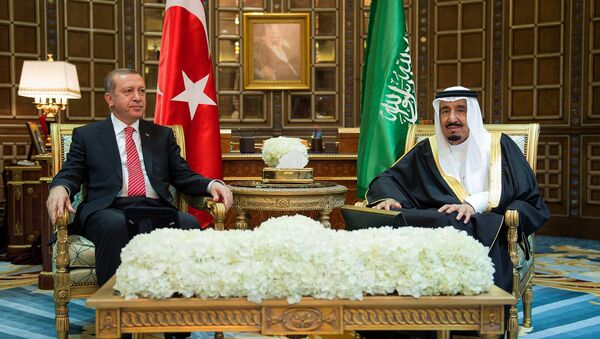“By agreeing to be among the likes of Comoros, Mali and Niger and led by Saudi Arabia, Turkey forfeited its claim to being the historical Sunni counterweight to Iran, going back to the 16th-century rivalry between the Ottoman Empire and the Safavids. That is not a role suited to a country with an imperial legacy whose glory is revisited frequently by the current power holders in Turkey,” it says.
The website therefore reasons that President Recep Tayyip Erdogan's rule had already “made Turkey a part of a subregional axis competing with Saudi influence over the Sunni world.”
“Saudi Arabia and Qatar have cash and hydrocarbons; Turkey has military muscle. It looks as if the Gulf monarchies are allowing Turkey to benefit from their treasuries while making use of Turkey’s geopolitical weight. The Saudis seem emboldened by having Turkish muscle on board in their confrontational attitude toward Tehran.”
The next example of Ankara’s failure is its recent rapprochement with Israel, the website says, quoting Erdogan’s announcement on January 2, while on his way back from Saudi Arabia that “Turkey and Israel need each other.”
“A statement so worded may sound like Erdogan’s assessment of the changing geopolitics of the Middle East and reflect Turkey’s stepping back from contesting Israel’s posturing in the region,” it says.
“Turkey, after following the Saudi lead against Iran and trying to soften its relationship with Israel, the most anti-Iran power center in the region, is not only forfeiting its claims for regional power status but also taking part in the anti-Iran regional coalition in a way that has never been done before.”
“Moreover, a broader coalition connecting Turkey to Saudi Arabia and also with Israel is thought to have a favorable impact on Washington, its most powerful ally and one with which it has had uneasy relations over Syria.”
And yet one more example is “the breaching of Turkey’s most outspoken “red line” in Syria: the Kurdish Democratic Union Party (PYD) crossing the Euphrates.”
“With US support and coordination, the Syrian Kurdish armed forces, the People's Protection Units, are fighting the Islamic State (Daesh/ISIL/ISIS) — and if it moves to the west of the Euphrates, in the Azaz-Jarablus corridor as well. This area is mainly controlled by Syrian groups that Turkey supports and constitutes the main link between Turkey and besieged Aleppo that would end up in linking Rojava (the Syrian Kurdish areas) as a single geographic entity under PYD rule from the Iraqi border all the way to the west, covering hundreds of miles of Turkey's border with Syria.”
And while the solution to the existing concerns yet remains to be seen, the website predicts that |difficult times lie ahead for all those involved in the Syrian conflict and especially for Turkey and its internationally weakening strongman, Erdogan.”






